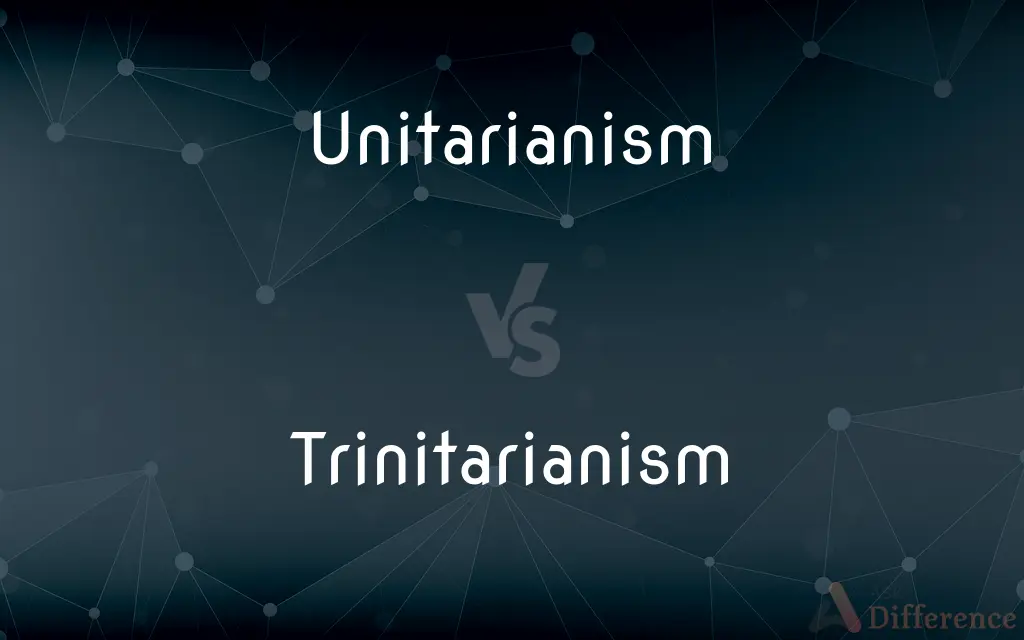Unitarianism vs. Trinitarianism — What's the Difference?
By Tayyaba Rehman & Maham Liaqat — Updated on May 9, 2024
Unitarianism emphasizes the singular personhood of God, while Trinitarianism teaches the existence of one God in three persons: Father, Son, and Holy Spirit.

Difference Between Unitarianism and Trinitarianism
Table of Contents
ADVERTISEMENT
Key Differences
Unitarianism holds that God is a single entity, rejecting the division of God into three distinct persons, a view primarily supported by its emphasis on the oneness and unity of God. In contrast, Trinitarianism, a doctrine central to mainstream Christianity, asserts that God exists as three co-equal, co-eternal persons.
Followers of Unitarianism often focus on the strict monotheism that resembles the beliefs found in Judaism and Islam, whereas Trinitarians align with the Nicene Creed, which explains God as three persons, each of whom is fully God.
Unitarian theology typically rejects the divinity of Jesus Christ, viewing Him as a prophet or a divine agent but not God himself. On the other hand, Trinitarianism holds that Jesus is God the Son, one of the three persons of God, fully divine and fully human.
Unitarianism often arises from a desire to adhere strictly to the monotheistic principle found in the Hebrew Scriptures, interpreting New Testament texts accordingly. Meanwhile, Trinitarians find scriptural support for their view in the New Testament, citing passages that refer to the Father, Son, and Holy Spirit in ways that imply their distinct personhood and unity.
The approach to the Holy Spirit also differs; Unitarians may view the Spirit as a force or presence of God, not a distinct person, while Trinitarians recognize the Holy Spirit as a full and equal member of the Godhead, involved in the world and in the life of believers.
ADVERTISEMENT
Comparison Chart
Concept of God
One person, one essence.
One essence in three distinct persons.
View of Jesus
Prophet or divine agent, not divine.
Co-equal, co-eternal with God, fully divine.
Holy Spirit
A force or presence, not a person.
A distinct, divine person.
Scriptural Basis
Emphasis on monotheistic texts, particularly the Hebrew Scriptures.
Based on interpretations of both Old and New Testament texts that suggest a plural nature of God.
Theological Emphasis
Monotheism without person division.
Complex unity within divine community.
Compare with Definitions
Unitarianism
Focuses on the unity and singularity of God.
He attended a Unitarian church that stressed the oneness of God.
Trinitarianism
Each person is distinct yet fully God.
Trinitarians worship God the Father, God the Son, and God the Holy Spirit.
Unitarianism
Belief in a singular, indivisible God.
Unitarianism emphasizes that there is one God and no other divine persons.
Trinitarianism
Central to the doctrine is the equality and eternal nature of all three persons.
In Trinitarian doctrine, the Father, Son, and Holy Spirit are co-eternal.
Unitarianism
Often associated with rational religious thought.
Unitarianism appeals to those who seek a rational approach to religion.
Trinitarianism
Belief in one God in three persons: Father, Son, and Holy Spirit.
Trinitarianism is a foundational doctrine in many Christian denominations.
Unitarianism
Emphasizes ethical living and social justice.
Their Unitarian faith drove them to be active in social justice causes.
Trinitarianism
Foundational for most mainstream Christian theology.
The Nicene Creed, which outlines Trinitarian belief, is recited in many churches.
Unitarianism
Rejects the divinity of Jesus and the personhood of the Holy Spirit.
Unitarians respect Jesus as a prophet, not as a divine entity.
Trinitarianism
Emphasizes the relational aspect of the divine nature.
Trinitarianism teaches that the divine persons are in constant loving relationship with each other.
Unitarianism
Unitarianism (from Latin unitas "unity, oneness", from unus "one") is a nontrinitarian Christian theological movement that believes that the God in Christianity is one singular person, as opposed to a Trinity ("tri" from Latin tres "three"). Most other branches of Christianity define God as one being in three persons: the Father, Son, and Holy Spirit.
Trinitarianism
Of or relating to the Christian Trinity.
Unitarianism
An adherent of Unitarian Universalism.
Trinitarianism
Believing or professing belief in the Christian Trinity or the doctrine of the Trinity.
Unitarianism
A monotheist who is not a Christian.
Trinitarianism
Trinitarian Having three members, parts, or facets.
Unitarianism
A Christian who is not a Trinitarian.
Trinitarianism
One who believes in the Christian doctrine of the Trinity.
Unitarianism
The belief in a single God, not divided into any aspects, particularly when presented as a contrast to Christian trinitarianism.
Trinitarianism
A member of a Roman Catholic religious order founded in 1198 and now devoted to teaching, nursing, and pastoral work.
Unitarianism
The doctrines of Unitarians.
Trinitarianism
(theology) The monotheistic Christian doctrine that defines God as three divine persons or hypostases: the Father, the Son (Jesus Christ), and the Holy Spirit.
Unitarianism
Christian doctrine that stresses individual freedom of belief and rejects the Trinity
Trinitarianism
The doctrine of the Trinity; the doctrine that there are three distinct persons in the Godhead.
Trinitarianism
Christian doctrine stressing belief in the Trinity
Common Curiosities
What is the main theological difference between Unitarianism and Trinitarianism?
The main difference is the number of divine persons: Unitarianism advocates for one, while Trinitarianism believes in three co-equal persons.
Why do Unitarians reject the Trinity?
Unitarians often reject the Trinity as they believe it contradicts the strict monotheism taught in the Bible.
Can someone be a Trinitarian and not belong to a mainstream Christian denomination?
Yes, belief in the Trinity is possible outside mainstream denominations, though it is a core doctrine in many of them.
Do Unitarians celebrate Christian holidays like Easter and Christmas?
Yes, many Unitarians celebrate these holidays, often focusing on their ethical teachings rather than their divine implications.
What scripture do Trinitarians use to support their beliefs?
Trinitarians often cite verses like Matthew 28:19, where Jesus refers to "the Father, the Son, and the Holy Spirit," suggesting a plurality within God.
Is Unitarianism considered a Christian denomination?
It is considered part of the broader Christian tradition but distinct in its rejection of the divinity of Christ and the Trinity.
What are some modern movements within Trinitarianism?
Modern movements include those emphasizing social justice, ecological stewardship, and global evangelism, reflecting Trinitarian relational theology.
What is the historical context of the development of Trinitarian doctrine?
The doctrine was formalized in the early centuries of Christianity, particularly at the Council of Nicaea in 325 AD, to address various theological disputes.
How do Trinitarians explain the concept of three persons in one God?
Trinitarians explain it as a mystery of faith, where three distinct persons share one essence, co-existing eternally without division or separation.
How do Unitarians view the Bible?
Unitarians typically view the Bible as a profoundly important religious document but often emphasize a metaphorical rather than literal interpretation.
Share Your Discovery

Previous Comparison
Purlin vs. Girt
Next Comparison
Ordinality vs. CardinalityAuthor Spotlight
Written by
Tayyaba RehmanTayyaba Rehman is a distinguished writer, currently serving as a primary contributor to askdifference.com. As a researcher in semantics and etymology, Tayyaba's passion for the complexity of languages and their distinctions has found a perfect home on the platform. Tayyaba delves into the intricacies of language, distinguishing between commonly confused words and phrases, thereby providing clarity for readers worldwide.
Co-written by
Maham Liaqat











































